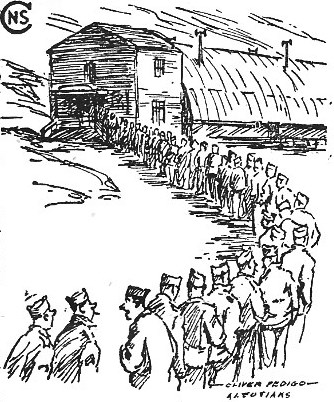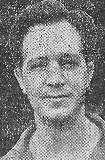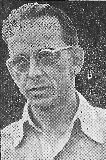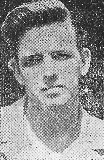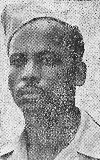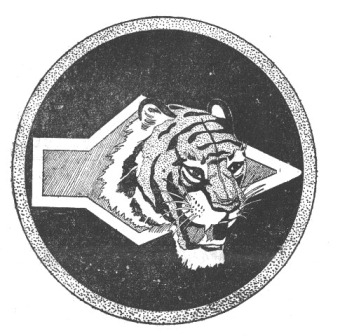

Vol. II No. 33 BENGAL AIR DEPOT JULY 28, 1945
AERIAL SHOW FEATURES AIR FORCE DAY
|
AREA PADDLE CROWN FOR DEPOT
SERGEANT RETURNS, TELLS WHY Yesterday in pursuit of duty and information, a Tiger Rag reporter interviewed M/Sgt. Henry P. Merrifield, who recently returned to this "Dutch-oven" Depot after a jaunt in Uncle Sugar territory where he attended a 32-day course in Personal Affairs. "Tell us all," the scribe begged, pouring a warm bead of sweat from atop his nostrils. "We studied nine hours a day," Merrifield began, "six days a week with between
"Stop!" Merrifield's mouth made a pursed O. He stopped. His eyes widened as he watched the reporter's raised hand, slightly palsied. "How did the women look?" he was asked. "The night clubs? Is the food and cigarette rationing killing off our relatives? Describe the women. Are many guys being discharged? How about the women?" "Oh," Merrifield muttered, "Oh... I see. Well, I stayed at the Capitol Hotel in New York. The girls are beautiful. And plentiful. They walk down the streets four and five abreast, waiting to be noticed and willing to get acquainted. They're lonesome too, you know. "There's plenty to drink at the bars. Since there are so many men returning from overseas the MPs are very lenient. Most of the men don't even wear neckties and aren't called down by the MPs. And many of the fellows who were there on leave or Temporary Duty and had 85 points were being discharged on the spot if they asked to be." Merrifield went on: "The cigarette shortage is improving. Soldiers, however, are being rationed six packs per week, which may account for it. Food is still a rough problem. Civilians are allowed 50 red pints a month, but a pound of butter takes 24 points while meat between 8 and 12. The inquirer's eyes fluttered uncertainly. "But everyone in the States seems to be just marking time waiting for the boys to come home." The fluttering ceased and a sigh came from the reporter's chair. "The lights are on full blast along Broadway now. I went to the Diamond Horseshoe and cafe society and servicemen are treated like kings. "I was in Brazil on V-E day. We had a forced landing and layed over there. They really celebrated V-E day. If a serviceman showed his face the overjoyed crowd would practically mob him. Merchants closed and barred their doors and windows so things wouldn't be damaged in the excitement." "Go on," Merrifield was urged. "Go on." "Almost everything is 'In Bounds' in Brazil and it's a red-hot town. Coming back here I was backlogged at Cairo for a while and visited the pyramids; even went inside one and climbed to the tombs located near the top. "But there's no place like the States. I've made a complete trip around the world now since last August, but Shangri-La just can't be beat. It's going to be hard on the men who take a 45-day furlough and return to India." "Why?" he was asked. "You hate to come back too badly. It's like breaking all your fingers and toes a small section at a time." Sgt. Merrifield should know. |
Depot To
Watch AAF
Demonstration
The observance of Air Force Day on Wednesday, August 1st in this area will feature an aerial demonstration by combat elements of the 10th Air Force. Marking the 38th anniversary of the founding of the greatest air power in the world - the USAAF which started as the Aeronautical Division of the Office of the Chief Signal Officer, with one officer and two enlisted men - the Depot, whose contributions in the way of supply and repair have made so much of the Air Force's record possible, will participate in several ways.
The demonstration of aerial might, including the use of pyrotechnics and chemicals will be held between 1300 and 1500 hours Wednesday. As far as is practicable, military personnel of the depot will be relieved of duty during the two hours to witness the show from somewhere between the boathouse and shop area along the Hooghly. Only a few men will remain on the Depot to maintain security.
AAF BAND
An AAF band will be at the river to render martial airs. An AAF movie short will be shown at the post theater that evening to further emphasize the use and effectiveness of air power.
The display of some of the theater's air strength is particularly fitting. For the air power that has cleared the skies above Burma and China and attacked strategic targets - so incessantly and is playing an increasingly important role in the defeat of Japan - just as it did in Europe - depends heavily upon the Bengal Air Depot for its supplies.
As the 10th Air Force fighters and bombers zoom overhead the men of the Depot can take pride in the realization that their efforts have been a major factor in the growth of air power in India-Burma and China skies. Many of the engines that roar defiance at the laws of gravity were shipped or repaired here, or both. The propellers that are but a blur as they knife the ozone went through the hands of supply men here. The wings that provide the lift of the vengeful attackers once rested on Air Corps Supply shelves here. The belly tanks and pyrotechnics and chemical screens were listed on the records of Air Corps Supply, of Ordnance and of CWS on this base. The cannon and machine guns that sent the Japs streaming to the earth in flames were processed and repaired by small arms men at the shops. The medical supplies the men utilized at times began a long trek to their bases from here.
Of its millions of men in the Air Force, some have been glorified, some are unsung. But it took all kinds of men doing all types of work to make the feats of the crew members possible. That original group of three men has expanded into three million maintenance, control, supply and crew men.
The accomplishments in whittling down the German war potential are a tribute to the Air Force. And when the knocking down of bridges, blowing up of oil supplies, destruction of industrial capacity and stoppage of transportation and communication is finished in Asia wherever the Jap is, the Air Forces will rate a deep, low bow from the free peoples of the world.
When the United States entered World War I the Aviation Section had a total of 65 officers, 35 of whom were flyers, and 1087 enlisted men. Fifty-five airplanes, all obsolete, were on hand.
A year and a half after Pearl Harbor, over two million men comprised the Air Force.
The multiple components of air power are especially accentuated in this theater, with its difficult terrain, climatic elements and inadequate ground transportation facilities for war. This is a theater where supply by air had to play a major role, and did, in AAF operations.
The aerial show Wednesday is a tribute to the Air Force. And the men of the Bengal Air Depot have been an intrinsic part of the Air Force. This then, is a tribute to you, too.

|
NO PATENT ON COOK'S INVENTION
A complete new innovation for keeping squadron lawns trimmed was inadvertently demonstrated by Pfc. Howard McCaslin, chef de cuisine in the new area.
The innovation was prompted by curiosity and one (1) motorcycle someone had momentarily tethered outside basha U-308.
McCaslin's system, guaranteed to shear grass, and in fact keep shrubbery down to the raw roots, consists merely of mounting the said motorcycle with one carcass, human, and twisting on the gas.
Passersby extricated McCaslin from underneath the machine but not before a sizeable area of turf was plowed clean and in general splayed all over the landscape. Parties interested in weed removing may contact Pfc. McCaslin personally at U-308 where at present the inventor is nursing a mangled leg.
RATION-FREE BEER SOLD QUICKLY
"Beer... BEER... BEER!" The rumor spread out via the GI grapevine even before the foamy brew was unloaded off the barges. "It's unrationed and first come, first served," went out the news.
Then came the trucks. One huge forty-foot trailer job piled high and another 6x6 stacked low but solid. A glaring banner tacked on the side stated that the stampede would begin at 1400 o'clock.
Before 1400 o'clock queues of men started forming, jockeying into position and making a ragged khaki rope down the street. Tugs, jeeps, and weapons carriers bounced dust along the curbing disgorged men,
|
Two o'clock arrived. One second later, whether by fortune or strong elbows, Cpl. Robert Simpson of 9th Eng. Overhaul staggered away bearing the first case of unrationed beer ever sold on the Depot.
Thus began a sale equaled only perhaps by Macy's bargain basement in New York.
A whimsical monsoon spread a few raindrops for size. But unnoticed during the melee it became discouraged and moved on. Down the street, into waiting trucks, the beady liquid vanished out of sight like crickets in a wood pile.
Finally, drenched in sweat, but with the cigar-boxes overflowing with rupees, the PX wallahs were alone with empty trucks. Thirsty GIs, four rupees poorer but gastrically much richer, had fled to investigate their purchases and determine whether the Hyde Park beer was actually flat, which was why it was disposed of unrationed.
Next day, an additional 500 cases were secured. It too disappeared like a rock in a whirlpool. Which only goes to show that beer is beer, flat or otherwise, and that most GIs like it anyway they can get it.
|
Foundry Precludes Salvage Metal Waste
Shop area Maintenance will add a new feather on its distinctive production hat soon. The feather in this case being represented by a foundry now in the process of final construction. Designed primarily for recasting and molding non-ferrous metals like aluminum and brass, the foundry will melt down salvaged materiel and convert the molten ore into various odd or necessary parts which will then be standardized by the machine shop. Operations will begin as quickly as casting sand for the molds is secured. The blast furnace for the melting decomposition will have a heat generation of around 2,000 Fahrenheit degrees. Bengal Air Depot - A Year Ago S/Sgt. Earl Tews, recently commissioned a second lieutenant, was featured in the Depot Review, while the MPs who were ordered to shoot a dog turned in a report of one bullet expended in killing the animal and then were startled to see the dog appear on the Depot. "The Long Hard Road," predicting that, in spite of Gen. Eisenhower and P. M. Churchill's statements that the war in Europe would end by Christmas '44, it probably wouldn't turned out to be the most controversial editorial in the history of the Tiger Rag. The first of the weekly winners in the "Sweetheart of APO 492" contest turned out to be the sister of S/Sgt. Larry Chick of the Air Inspector's Office. |
|
Bronze Stars, Drivers Badges Awarded
Thirteen men recently added some metal on their theater ribbons when they were authorized Bronze Stars for their participation in the India-Burma Campaign throughout varying periods. They are, from 2005th Ord. Maint. Co.: 1st Lt. Arthur W. Dissinger (two Stars), T/Sgt. Stephen M. Budihas, T/Sgt. James Glynn, T/Sgt. Bernard
Included in the same headquarters General Order were six men awarded the Motor Vehicle Driver's Badge. Cpl. Frank F. Palazzo of the 83rd Hq. Sqdn., and five men from the 2480th QM Trk. Co.: T/5 Moshia F. Smith, T/5 Albert Zacour, Pfc. Ervin Wilkerson, Pfc. Charles E. Cowart, and Pfc. Nolan Wooten who in addition to the Driver's Badge also received the Motor Vehicle Mechanic Award. |
Movies - At Post Theatre at 8:00 pm daily except Monday. Three new shows a week. See DIS for daily schedule. Libraries - Books are available at Special Service Office and Rajah's Rest. Tours - Conducted by ARC. Alternate Sundays, visit Calcutta and boat trip on Hooghly. Saturday and Monday, Bata (Czech Village) for dining swimming. See Rajah's Rest and Beehive Schedules for further information on these and other ARC activities. USAFI - Armed Force Institute courses are available through the Special Service office. Swimming - Pool located back of Depot near river. Daily except Sat., Sun. and Tues, all day. Table Tennis - Fina's in I-B Championships at Monsoon Square Garden, Sunday, 8:00 pm. Symphony - Calcutta Symphony at New Empire Theater, tickets at Rs. 4/8 and 6/8. Sunday only. Stage Show - "Three Men On A Horse" at ENSA Garrison Theater, once nightly for as. 4, as. 8 and Rs. 1. Tickets at Burra, Cosmos, and 60 Clubs. New Empire and Garrison Theaters. REGULAR Dancing - Cabana Room at Burra Club. For couples only. Soft lights and sweet music. Rs. 5 per couple, dancing from 9:15 pm. Paintings - Victoria Memorial, north entrance, open 10-5 daily. Paintings of monuments throughout India. Lectures - Royal Asiatic Society of Bengal, 1 Park St. Talks at 6:30 pm every Thursday. Swimming - Victoria Memorial Pool, opposite memorial, daily except Mon., Tues., and Thurs. For U.S. Military personnel only. Swimming - At Batanagar on ARC tour from Burra Club, every Mon. at 9:00 am. Tours - Conducted by Burra Club. Kali Temple, Tues., Thurs., Sat. at 9:00 am. Mon., Wed., Fri. at 5:00 pm. Jain Temple, Mon., Wed., Fri. at 6:00 am. Tues., Thurs., Sat. at 5:00 pm. Calcutta Mint every Friday at 2:15 pm. |
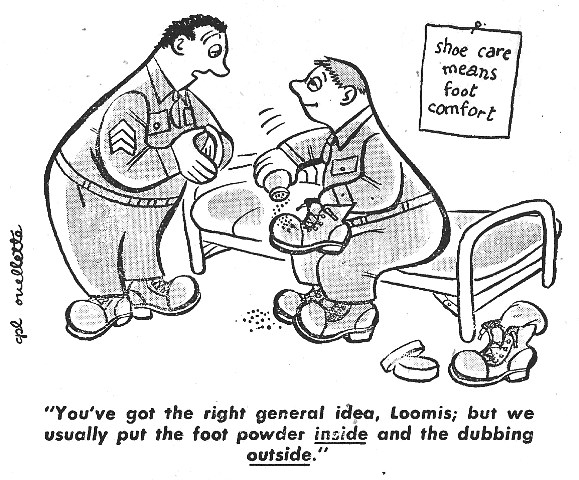
|
Auld Lang Syne Dept.
That ever-present realization of what a diminutive sphere we exist in after all came into focus again this week. Pfc. Raymond Betts of the 48th Supply bumped into two men recently at various times from his old home town, La Feria, Texas, which boasts a population of only 7,000 noses.
For the number one meeting Betts noticed Cpl. Randall C. Sherwood of 2005th Ordnance in the PX. This brought about the first reunion and note comparing for Betts and Sherwood had tramped through many a hilarious time together. Especially in a little Texas town named Reynosa where they'd buried many a skeleton in the closet.
Then came T/5 Harold Jones of the 726th AAF Band. Jones stopped in at the Personnel Section for some information and there was Betts trying to control his amazement over this second hometown meeting in a matter of days.
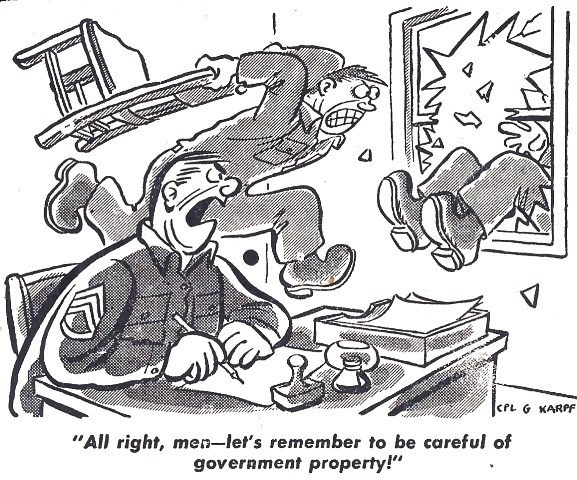
|

|
Dear Editor:
In regards to your "Time Saving Device At Mail Call" write-up, which appeared in 14 July 1945 edition, the following information is submitted for the benefit of the readers of Tiger Rag. I will give you the history of the Mail Board at the 1953d Ordnance Co.
The Mail Board was originated December 1943 by the Mail Orderly at that time. The purpose was to save the men time and trouble of sweating out Mail Call and to save the Mail Orderly the trouble of bellowing out the lucky names. 1st Sgt. Prevour at that time was T/Sgt. Prevour, Section Chief of OGS at the Ordnance Warehouse. T/Sgt. Aaron, whom he gives all credit for the Mail Board, refused to letter the Board for reasons unknown. The Board was made by Carpentry Section, painted by the Mail Orderly and the names were lettered by T/4 Charles W. Faulkner, one night in December '43, as he performed the duty of CQ.
Up until 14 July 1945 the Board had served the purpose intended. If anyone wishes to make it known to the public, why not give the men credit who are responsible? When 1st Sgt. Prevour was assigned duties of 1st Sergeant the Mail Board was and had been if effect for over six months. Several men had been transferred out and into the company. Thus, a new Board was made and the T/Sgt. Aaron took care of the lettering which one might call a request order.
- T/5 Frank G. Jackson
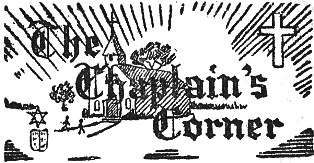
|
The story is told of one who, passing through a field, beheld his neighbor, a man advanced in years, planting an oak tree. "Why do you labor so?" he asked, "you surely do not expect to live long enough to reap the fruits of your planting!"
"Our fathers," replied the old man, "planted trees not for themselves, but for us, in order that we might enjoy their shade and their fruit. I do likewise, for those who will come after me."
There is a great lesson that we, in our time, may learn from this ancient Rabbinic legend, as we wait longingly for the great hour of victory and for our return to home and loved ones. Many of us have given frequent expression to hopes and plans for the future - the things we shall do, the life we shall live, in the happy hour of restoration. There is so much we will have to compensate for, the loss of so many pleasures and privileges, the absence of so many of the basic joys of life, so keenly missed during months and years of yearning.
There is none who will deny our right to the blessings of life, the full life. Our hopes and dreams are truly worthy of fulfillment. But with them all, comes the duty and the grave responsibility of planting a goodly tree which will yield shade and fruit for those who will come after us. It is for this that we toil and labor in the present hour, this must be even our fondest dream - that our children and their children after them may reap the fulsome of peace and blessed living for which we now labor, and for which so many of our comrades have given and will yet give their life blood.
Out of our united struggle against call us truly blessed"
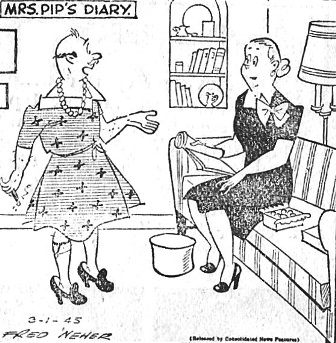 "I just wanted to see why it takes you so long to dress."
"I just wanted to see why it takes you so long to dress."
On Sale The Depot insignia, a patch four inches in circumference, featuring a tiger's head over a white trimmed red arrow against a blue background, featured in Tiger Rag's masthead, is on sale in the post tailor shop. There are two types, leather which costs four rupees eight annas and cloth which sells for 12 annas. They are authorized to be worn on the left breast of field jackets and T-shirts. |
The Information and Education discussion periods, which follow the talks given by the various I & E representatives in the Depot's organizations, have proved to be a huge success. Topics covering all phases of military and post-war life have been talked and discussed by the men with a fervor and intelligence that should convince the detractors of the average soldier's IQ and awareness of political, social and economic trends and possibilities to clamp their lips firmly together and curl up in a corner with a copy of "Superman."
That the army attaches importance to these lecture and soldier participation sessions is evidenced by the fact that the attendance of every soldier is compulsory. A further indication of the direction of the wind at higher headquarters is in the recent directive stating that I & E periods will be held during "duty hours" rather than off-duty time, as was hitherto the case. Starting this week, all units will hold I & E periods every Thursday. It is the obvious intention of the brass-that-be to make these pro-and-con verbal exchanges as attractive and interesting as possible. The belief being that is just as important that the soldier's interest be maintained and his participation be encouraged as it is for him to attend.
During recent weeks, discussion groups, in spite of warm dayrooms and multiple distractions outside, have covered subjects of vital importance to GIs both now and when they return to the existence of the feather merchant. Compulsory Military Training, Labor and Capital, War Against Japan, The UNCIO Conference at San Francisco, Soldier Readjustment to Civil Life, China's Role in the War, Shall We Feed Europe and German Reparations are but a few of the points that have thus far been debated and argued. In some of these periods, the speaker has presented his facts and met with no response. In most units the discussion leader could not sit down for the barrage of questions and rebuttals that were fired at him.
The latter is a healthy and admirable state of affairs. There are few of us who cannot learn from the free interchanging of ideas. It is an effective way of combatting provincialism, for the comparison of perspective and ideas brushes aside barriers of geographical location, region and politics. The idealist learns from the practical person, the high school or college student from the man twenty years in business and the Southerner from the Northerner or Westerner, and vice versa.
The army's insistence on maintaining and improving these I & E programs
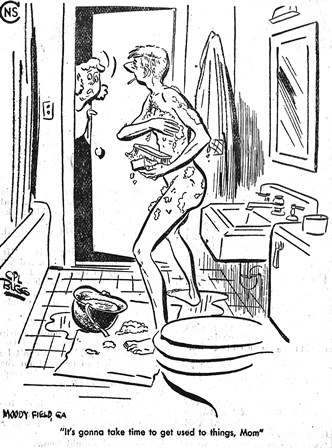
|
Among the U.S. Army's contentions is that the American soldier is the best-informed in the world. If interest in world events and curiosity about the thoughts and lives of other peoples are any indication, the men of this Depot support that claim. News via the radio and newspapers, resumes in magazines, maps and I & E charts in front of the PX and in the Rajah's Rest - all receive much attention. The extensive use of the facilities of USAFI is a commentary on the desire to further improve education and fit themselves more adequately for civil life. That desire is a proof of intelligence.
The value of the I & E discussion groups cannot be overemphasized. The men of this Depot - along with other soldiers - will be the leaders of tomorrow's America. The fate of the nation, and probably the world, will rest on their shoulders. The discussion periods go a long way toward preparing them for that responsibility. There is no more democratic or neighborly practice than the free discussion group. When men can work together, talk together, argue together for the common good, the basis for a long siege of peace is being welded. Out of the working together and discussion of common problems comes understanding and cooperation. And those are the necessary components of any attempts to extend culture and better the conditions of the people of the earth.
|
Devils Beat Signal For Show Title
The Devils of the 1961st QM Truck Co. took the Depot Horseshoe Championship by trimming the 923d Signal team in three out of the first four games Saturday evening on the 83d Hq. Sqdn. court.
Both teams completed the regular schedule with identical records of six wins and one loss. The schedule was protracted due to the monsoons which made the courts unusable for long periods of time.
Harlow and Holleran of the Signal team took the first set by defeating the Wells-Olds doubles combine of the Devils 21-17.
Ames and Pinson evened it for the victors with an easy 21-8 win over Montgomery and Helms.
Havlicek put the Devils one up by trouncing Miller in the initial singles game, 21-14, and Coppola applied the crusher by slamming enough ringers to take McNerney of Signal 21-9 for the Championship.
The unnecessary fifth game saw Tower of Signal beat Armich, 21-19, to bring the final score to 3-2 favor Devils.
A team trophy and individual cups were presented to the victors while the Signal squad received a runner-up trophy. The tourney completed the Special Service Office's sports schedule for 1944-1945 season.
|
'Trotters Trip Tolly To Enter Finals
CALCUTTA, JULY 22 - A brilliant Globetrotters team playing with championship caliber fought their way into the finals of the Calcutta Area Table Tennis Tournament tonight by defeating the Pace Setters of Camp Tollygunge 7-0. The match was played at Monsoon Square Garden before a large GI crowd. |
|
Volleyball Champs In I-B Tourney
The 47th Supply's "Division Supply" Depot Volleyball champions, have been invited to participate in the India-Burma Tournament to be held in Calcutta next month. This strong aggregation consisting of J. Shanks, L. Scatera, C. Schoenbaum, V. Smith, E. martin, S. Mytych, S. Flitchenfeld, J. Kelley, F. Sater and C. Redmon is a threat for the title. |
|
Hanley Heads Both AAF And ASC
Maj. Gen. T. J. Hanley, Jr. has assumed command of the AAF IBT, succeeding Lt. Gen. George E. Stratemeyer, appointed AAF Commander of the China Theater. Gen. Hanley will retain command of ASC IBT and Hastings Mill will continue to serve as headquarters for both commands, in addition to the ICD ATC under Brig. Gen. William H. Tunner. Heading the principal divisions of Gen. Hanley's staff will be Brig. Gen. Thomas B. McDonald, chief, Maintenance; Col. Donald L. Hardy, chief, Supply; Col. Tracy Davis, chief, Personnel and Training.
Col. D. D. Fitzgerald remains as Chief-of-Staff for ASC IBT and has also assumed the duties of Chief of Staff for AAF IBT. "With the Japs pushed back beyond the frontiers of this Theater, aside from the mopping up in southern Burma, and their encirclement gradually being accomplished from the Pacific," said Gen. Hanley, "our main mission in this theater will be the maintenance of aircraft for the flow of supplies to China and the delivery of such tactical and strategic aircraft as required by the 14th and other Air Forces in China." Maj. Towne to U.S. Gen. Staff School Maj. Claire M. Towne, former CO of the 9th Engine Overhaul Sqdn. and Commandant of the Shop Area departed Stateside recently to attend the 25th class of the Command and General Staff School at Fort Leavenworth, Kans. The Air Staff Service Course which Maj. Towne will attend is a three months course and scheduled to begin August 1st. Mal. Lloyd J. Stuckey, former CO of the 83d Hq. Sqdn. has assumed command of the 9th Engine. |
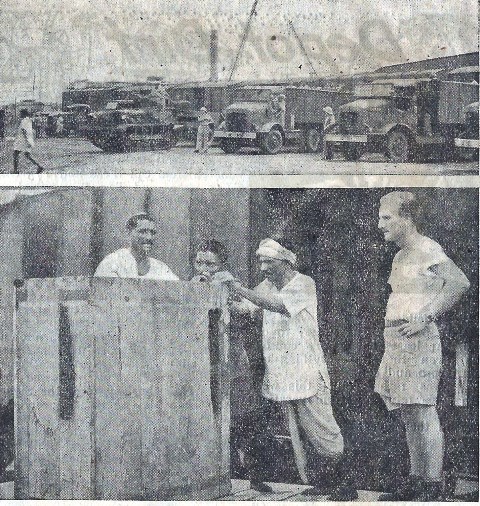 (Top) Trailers, trucks and tractors of the Shipping Department fleet lined up at a railhead unloading materials which will soon be on the
way to every part of the theater.
(Top) Trailers, trucks and tractors of the Shipping Department fleet lined up at a railhead unloading materials which will soon be on the
way to every part of the theater.
(Bottom) Pfc. Verl McKee, floor supervisor, at Shipping, makes a check on some goods which are passing through the department.
Air Corps Supply Shipping Dept.
Handles AAF Equipment for I-B & C
Sometimes it is difficult to imagine the huge amount of material handled on this Depot. Air Corps supply is spread out over a large area and in many warehouses and offices. At one Department however, is concentrated the work of practically the whole Supply. This is the Shipping Department, the function of which is the handling for shipment to the I-B and China theaters, all Air Corps property and when necessary the goods of other branches as well as individual organizations.
Material is shipped by air, rail and water but before leaving here thorough processing must be accomplished. This must be done rapidly to make room for new materials which are flowing into the department 16 hours daily. Six by sixes, trailers and weapon carriers in a constant stream pick up boxes from railheads, jettys and airports.
Boxes for shipment first arrive at the department's Receiving and Weight Division where they are sorted according to group, weighed and identified. Each box or sometimes as is often the case groups of boxes contain shipping tickets on which is marked the contents, serial numbers and original priority. These tickets can contain anywhere from one to a hundred items. The Receiving and Weight section checks each box against the tickets to determine if the order is complete and at the same time check for APOC's (airplanes out of commission) and emergency shipments which they push on ahead. The weight is marked plainly on the individual box and all shipments are assembled in their respective place on the floor to await labels.
In charge of Receiving on the day shift is T/Sgt. Dickey R. Wellborn of Independence, Va. Wellborn has been in the army for three and a half years and has been overseas almost two years. He is assisted by Pfc. Benedict F. Renk of Cleveland, who was also a shipping clerk as a civilian. He is a rookie here having just completed his fourth month in India. Floor supervisor is Pfc. Verl McKee of Peoria, Ill., who is a two year veteran here on the Depot. Verl is hard working and conscientious. It is in McKee's department that the labels containing the consignee, consignor, contents, box no. and new priority number are applied.
PRIORITIES
The priority is assigned by Sgt. Aldus E. Gauble of Champaign, Ill., a two year veteran, who is also the boss of the entire department. In doing this the sergeant must take into consideration the original priority recommendation, the backlog on its particular destination, the urgency of the item and the available transportation. Gauble is one of the hardest working men on the Depot but he laughs when he tells us that "this is nothing," we should have been around a few months back before the new men arrived. In those days Gauble and four men, Peters, Jordan, McKee and Davis, did the work that fourteen are doing now. The explanation explains the sergeant, "We had to do it so we did." Recently arrived in the main office to work with Gauble is the Shipping Officer, 1st Lt. Wilbur L. James of Montgomery, Ala. According to his men Lt. James is a top flight shipping officer. A former auto parts dealer in Alabama, the lieutenant has been in the service since late 1940. He is a golf and tennis enthusiast. Lt. James and Sgt. Gauble must be certain that all material has been screened properly. Some outfits have changed bases or destinations after the original requisition and their new location must be ascertained. In the IB and C theaters are over 35 shipping destinations.
After processing, all goods that are going by rail or water are stored in one of four warehouses to await available space. Handling rail freight is Pvt. Glenn Rhen of Middletown, Penn. Glenn, who has been in India for eight months, is an old soldier having been in the army since 1935. He is married.
AIR FREIGHT GOES JALDI
Air shipments are processed in the same manner as rail and water but they are shipped in a hurry. Air means speed so air freight doesn't stay in the department more than eight hours. A schedule has been set up at the airports whereby they receive the goods in the day and load them on the planes at night for takeoff the following morning. Shipping has trucks running to the airfields seven days a week and when something big pops all available trucks are called. APOC's are handled slightly differently from regular air freight. A red label is placed on the box and a red margin is painted around the perimeter of the box. This means RUSH, airplanes out of Commission! On one occasion a 75,000 lb. requisition was received for urgent use in China. Twenty three hours after the radiogram was received at this Depot the goods were on the way. Remarkable!
Sgt. Arthur J. Davis from Burrton, Kans. is in charge of air freight. He is a former employee of the Bay Oil Co. of Kansas. He has been in the army since 1942 and has been overseas a year. Also handling Air Freight are two very efficient fellows: Sgt. John C. Flannagan of Kingston, NY and T/Sgt. Umberto D'Arcangelo of Brooklyn, NY. Flannagan, as the name might imply, is a lawyer and attended the University of Notre Dame. He has been overseas for six months. Sgt. D'Arcangelo was a stock clerk in his civilian days. He has been in the army three and a half years and has been in India for seven months. He is married and is expecting a blessed event back in Brooklyn any day now. He wants a boy.
Many complications can develop in a department of this size. Straightening out the thousand and one problems that come about during the day is
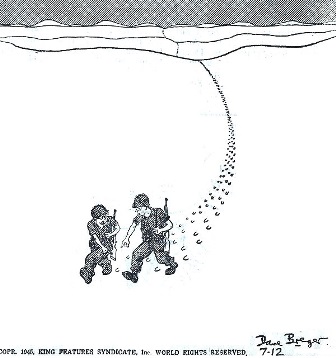
|
NIGHT SHIFT
During the night shift much can be accomplished in the processing phase. Boss of the shift is Cpl. Harry O. Peters of Pontiac, Ill. The genial, intelligent corporal is a former manager of a large chain store. He has been in the army since early 1943 and has been in India nearly two years. Cpl. Harry E. Woodson was a bank teller as a civilian in his home town of Narrows, Va. and here at the Bengal Air Depot is in charge of night shift receiving at Shipping. His three months overseas still call for the label of rookie. Pfc. Wesley F. Hobson of Brooklyn, NY was also a shipping clerk as a civilian. During his army career he attended three different tech supply schools. Hobson has been in India for seven months and at present is handling all APOC work on the night turn. Pfc. James Johnstone, Jr. screens and checks all shipping tickets at night. He has been in the army a little over a year and a half and has spent only four months in India. Johnstone id from Hyattsville, Md. and before entering the service was employed in the Administrative Office of the U.S. Courts.
The citations and commendations that the Shipping Department is indirectly responsible for are too numerous to mention. One thing is certain, these Air Service Command GIs work like hell!
|
(And Won't It Be?) BY TIGER RAG'S EFFICIENCY EXTROVERT After a careful inventory of various concerns the TR business adviser has discarded them all. Even owning a bank is unsafe these days with termites breeding like they do. Yet since the realization is there that one must do something to occupy the mind here's the best suggestion to date: Get into the telescope or binocular business. There, is a pure gem. With a reasonable chance for expansion and focusing. Here's the pitch. A tragedy - or a new era of entertainment depending upon how you look at it - has been unveiled throughout the States. A shortage of venetian blinds exists Stateside! And several months ago old-fashioned roller-shades went off the market because of a cloth shortage! Just consider and visualize, the possibilities of the binocular business. It is tremendous and filled with long range speculations both indoor and outdoor. Your product well sell like burlesque ducats to a Siamese act. Of course, if the venetian blind industry can receive more tape from the War Production Board to hold their slats together, even the telescope business is doomed. For window shades will certainly cook your goose even to the pin-feathers. Yet therein lies the gambling venture of the thing. Just suppose the shade business goes bankrupt. Brother, you're in! Word will get around. People will talk and advertise your product: "Using one of blah-blah"s telescopes last night I picked up a feature clear to 73rd and Broadway. On the second story a little blonde --" Well, you can see the success of the thing can't you? If only the War Production Board holds out and there's no more window shades this business will have no rival. Look into it some night yourself and see. |
INSTRUMENT MEN ON LEDO ROAD
This is the tale of three men who went into Burma as a mobile Instrument Repair Unit and came back full fledged auto mechanics. The men, S/Sgt. Bernard Kimmelman, T/4 Otto Weissman and Pfc. Alexander Levine, are all of the 2005th Ord. Maint. Co. Base Instrument Unit.
Levine started the account of the amazing transition. "We went down to relieve four men - T/Sgt. James Glynn, T/3 Fred Smith, T/5 Sam Corey, and Pfc. J. W. Miller - who had set up a traveling Instrument Repair Shop covering out of the way places in Burma.
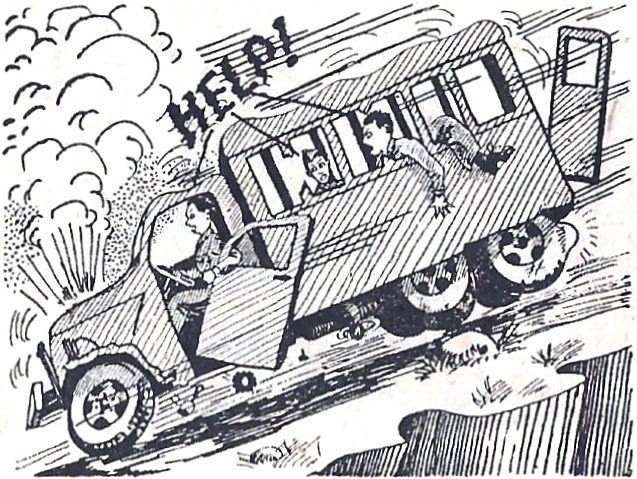
|
"At Chabua they assigned us a truck," Weissman broke in. "But actually it was a dilapidated bundle of misery. Both the foot and emergency brake were gone, the steering was shot and would spin around free-wheeling until it caught, the motor has asthma, the body rickets, and the tires a disease all their own. And when you herd a job like that over the Ledo Road you're practically making a down payment on a harp and wings."
Kimmelman came in: "Three quarters of our time was spent fixing that truck. After a while our job, instrument repair, was just a kind of sideline for we were always busy getting the truck to run. We kept count and in our two months there had 26 flats and 7 blowouts. At Lashio we decided to stop at a PX and because the brakes didn't hold Weissman drove the truck through the PX's wall. There was quite a commotion about that."
"Once when we came to an intersection," Weissman said, "we met a convoy. The brakes missed again. We scooted in front of a general's car, stalled the convoy and you could hear the echoes as the bumpers struck together stopping. We got in more trouble there. It seemed like all we did was overhaul the engine and patch the body together."
"After making our circuit," Levine interjected, "we came back with this vehicle over the Ledo Road. The monsoon really keeps that road tore up. In many places because of landslides you have to wait until the work crews clear things up. With our free-wheeling steering our hearts usually sat right in our throats. The drops off the road are straight down in many cases and the road winds and horseshoes. We saw trucks far down in the valley that had gone over the sides because of slipping or dirt shoulders giving way.
"You don't see many traces of the war there anymore. Bulldozers and workmen have cleared everything up. You run across idols with their heads off or shell clipped, and temples, but most of the ravages have disappeared."
"Tell what happened when we returned to Chabua," Kimmelman prompted. Weissman laughed: "At Chabua where we returned that wreck they gave us we slammed one of the doors and it was just like in the movies. A door on the other side fell off. They took one look at the truck there and turned it in for salvage which should have happened long ago. We certainly learned about mechanics on that trip."
He produced a tattered, dirty Japanese flag. "Good windshield wiper," he said. "Souvenir too when it's cleaned up."
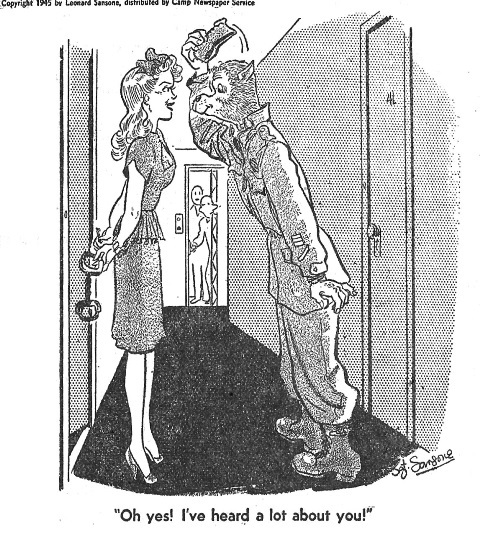
|
|
Some people like to talk, about themselves, about their hometown, about anything. But perhaps even better than just plain talk, they like a good argument.
I ran into one of these characters last week. I walked by his desk and smiled "good morning" and he started talking. He began by telling me that he was born in Los Angeles in the beautiful state of California in July 1919. He told me about all the beautiful places that he had lived. He gave me the impression that his wife and two children, a boy age one and a girl two, are waiting for him on Telegraph Hill in San Francisco.
Then this character went on to tell me that the fateful day when he put on his brown zoot suit for Sam was in June 1941. He talked on about his days in the Army and for some strange reason, he was always stationed in that beautiful state, California. The only point in his whole story where he covered up and did some quick double talk was when I asked him how he got his five stripes. He said something about: "That is something else again but it had nothing to do with work."
He changed the subject and started telling about those days in bountiful California when he used to be a stock clerk in a ladies full fashioned hosiery company. (What a racket that must have been. Trying stockings on shapely legs all day). But he doesn't want to go back to that. He wants to be a personnel analyst for the U.S. Employment Service.
He should have been winded by this time but he was still talking breathlessly about the last bourbon he had in 1943 and the beer he drinks over here. Speaking of here, he left the States in May 1944 and has 83 points to his credit. It won't be long before he will be seeing San Fran from the California Street cable car and what is the first thing he is going to do when he gets back? Pick up his hobby where he left it - and his hobby is marriage!
He hopes that his wife will recognize him. He is still skinny and more anemic looking but he still has the same light brown hair that always looks like he just washed it and can't do a thing with it and the same blue eyes and happy face.
This character could go on talking endlessly and if you like the bull shot at you or if you like a good argument, go up to Special Handling and ask for Ray Lower. Or bring yourself and your beer over to barrack C-105. - HCA
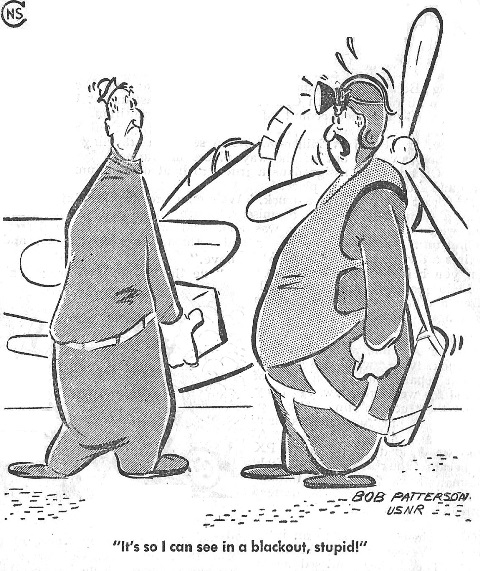
|
Awards Named In Foto Contest
Prizes have just been announced for the photo contest now being conducted by Special Service. Nine awards will be made with selections picked from the best three in each of the three classes allowed for submittance - photographs, portrait snaps, and shots of army activities in India.
First prize in each of the three individual classes will be a $25 War Bond. Second prize in all classes will be a $10 War Bond, and third prize will consist of engraved trophy cups.
Photos of all description and texture are coming in as the contest approaches closing date August 15th. All entries with the exception of the prize winners will be returned to their respective owners. The nine photographs judged the best will be retained, enlarged to the required size, and submitted for entry in the theater-wide contest now underway.
So rush those camera clicks in to Special Service for yours might have that distinctive flair to net the grand prize.
Beehive Babes Bothered by Bees
Apparently the bees in this vicinity are very literate. They have spotted the Beehive's sign and have set up housekeeping in one of the big trees next to the Red Cross club. They hover fondly about the windows of the club all day long and the Usually hospitable Red Cross girls say they draw the line at bees; they are delighted to have them... on the outside.
|
Highest contributing outfits to Tiger Rag this month were, in order, 1212th MP Co., 2005th Ord. Co., 83d Hq. Sqdn., 449th QM Plat., 893d Sig. Co. and the 47th Sup. Sqdn. Several other organizations raised their percentage to make this month's contributions slightly higher than June's. This incidentally, was the fifth consecutive month that the MPs led the contribution. |
|
At Beehive Two contests are in progress at the Beehive, one on art and the other snooker. Works of local GI artists - pencil and charcoal drawings, watercolors and oils will be exhibited and judged. The club's snooker players are keeping the table well occupied this week playing off the first stage of the contest. |
|
Technicolor films showing various phases of Indian life including aboriginal dances, gypsy snake catchers and game hunting will be shown Thursday evening at the Beehive when Colin Cleghorn will display the films he has shot in the remote parts of India. Cleghorn, a Calcutta businessman, also the author of "Calcutta, a Book for Visitors," will narrate during the display. |
|
ROVING REPORTER
The Roving Reporter wrapped himself in an envelope and swooped out to confound the mail clerks on their thoughts of India with: "Do you plan to come back to India after the war and make a career here?"
T/4 KENNETH MULLINS, 903D SIG. - Definitely not! I've seen enough of the Indian way of living to last me the rest of my life. The USA is good enough for me. T/5 ROCCO R. CANIANO, 923D SIG. - A thousand times, no! The climate gets me down too much. I want my wife and boy to grow up in the best country in the world. If you don't know which that is, it's the good old USA.
T/5 ALVIN F. PHARO, 2005TH ORD. - Yes! As a civilian I could find plenty to do here. India is a field of rich opportunity for a man who has studied the people and has something worthwhile to offer them. There are many fortunes to be made here. The younger men would be wise to look around now while they have the chance. CPL. JOHN E. AHEARN, 83D HQS. - I've had enough of India during my stay here already. Besides, I want to go to school and there's no place like Dartmouth College to get your learning. When I'm an engineer, I may have to come back on a job. But that'll be all, brother.
CPL. JPHN M. PICKLE, 47TH SUP. - No. It is too hot here. I just don't seem to get used to the people and customs here. Anyhow why should anyone want to leave the States where all the opportunities are? T/5 ROBERT MULLINS, 1953D ORD. - I never intend to come back to India if I can help it. Got a wife and job waiting for me in Champaign, Ill. and that's where I'll do all my staying. Don't get me wrong - India is okay for some, but that some just ain't me.
|
AGE OLD AGRA - CITY OF FAMOUS TAJ MAHAL
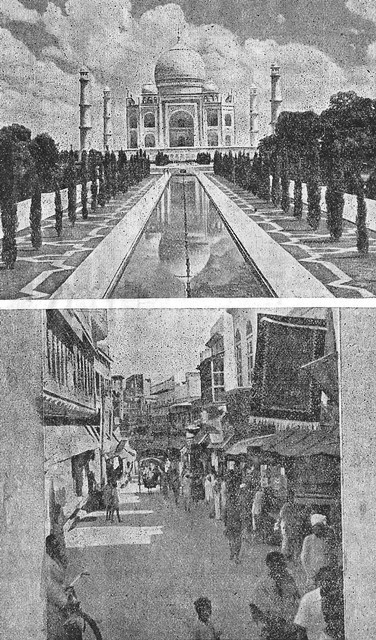 It took twenty-thousand men a day working for seventeen years to build this most famous mausoleum (top) in the world, the Taj Mahal, in Agra.
India's most noted edifice was constructed for King Shah Jahan as the final resting place for his beloved queen, Mumtaz.
Its beauty is such that it must be seen to be fully evaluated.
It took twenty-thousand men a day working for seventeen years to build this most famous mausoleum (top) in the world, the Taj Mahal, in Agra.
India's most noted edifice was constructed for King Shah Jahan as the final resting place for his beloved queen, Mumtaz.
Its beauty is such that it must be seen to be fully evaluated.
A narrow shopping street (bottom) in Agra. In the evening this thoroughfare is a seething mass of humanity. Books and clothing for children were the objects on sale here. Tongas and bicycles are the main means of transport in Agra but there is no place for them on these shopping streets come evening. |
AIR OF ANCIENTNESS
PERVADES AREA
AGRA, INDIA - The one thing that impresses most about this city and its surroundings is the atmosphere of ancientness. The aged monuments and mausoleums - most famous of which is the Taj Mahal - and the deserted but admirably preserved city of Fatehpur Sikri create in the observer a consciousness of the past glories of a city that has known a change of fortunes befitting one that is accredited in some authoritative quarters as the oldest on the face of the earth.
Agra has changed through the ages just as the social and political temper of India has altered; but enough of old Agra, its wealth glory and evidence of social culture, lingers to slake the appetite of the most romantic and curious souls.
A walk through the walled, six square mile city of Fatehpur Sikri, some twenty miles from Agra proper, cannot fail to wrench the visitor's thoughts back hundreds of years to the period when the city was the capital of India and the thriving stronghold of Akbar the Great. Camel caravans and elephant trains bearing the bedecked rulers and their resplendently decorated wives are easily visualized.
Modern Agra, which adjoins old Agra, is influenced greatly by the influx of Europeans. Several movie houses and hotels cater to these people, lending certain sections of a decided Continental air. It is Old Agra, its picturesque mixture of houses, projecting roofs and balconies, and narrow, crowded streets that imbues even the casual observer with the sensation of melting into the remote past.
The Taj Mahal was erected as a tomb for the wife of Emperor Shah Jahan, allegedly the work of twenty thousand laborers employed daily for seventeen years. Shah Jahan's great love for Mumtaz-i-Mahal and his grief at her passing inspired him to build a tomb that would surpass anything the world had seen or would see. He succeeded. For the marble monument is the finest shrine ever raised to love.
The Taj was completed in 1648. Four minarets - one on each corner - and a main gate which is centered in line with the queen's tomb are part of this astonishing architectural feat. Shah Jahan's tomb is slightly to the side of the queen's. The Taj is of white and yellow marble. Its dome is of pure marble that sparkles in sunlight and shines with heart-tugging serenity and beauty by moonlight.
Emperor Akbar, who brought Agra to its first greatness, designated Fatehpur Sikri his favorite city. He died in 1605 at Agra Fort after naming Fathepur Sikri as his Imperial residence. The Indian Government has kept the city in repair for it is noted as one of the finest groups of ancient architectural remains in upper India. Most of the monuments and buildings have remained in a state of perfect preservation.
Several of the buildings within the city are vivid reminders of by-gone grandeur. Among these are the Dewan-i-Khas, a high-domed one-story building; the Panch Mahal, a five-storied edifice which was used for recreation; the shrine of Saint Sheick Salim Chisti, a particular model of excellence. The
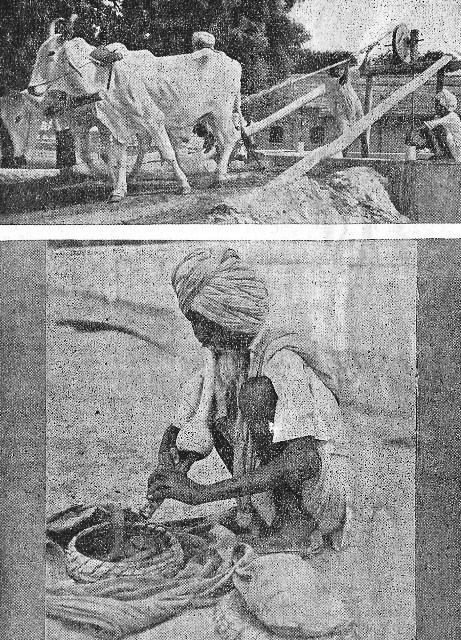 Because of the depth of the cisterns (top) around Agra oxen are used to pull the water up. They run down an incline to exert the maximum pull.
These deep wells are usually utilized for irrigation.
Because of the depth of the cisterns (top) around Agra oxen are used to pull the water up. They run down an incline to exert the maximum pull.
These deep wells are usually utilized for irrigation.
The Mohammedan snake charmer (bottom) playing the flute-like instrument at Agra is causing the cobra to writhe and waiver with the strains of the Oriental music. Contrary to belief in some quarters, cobras will not often attack persons unless provoked. In captivity they are made harmless by removing the poison. |
Several miles from Agra is Sikandra - noted mainly because it is the imposing tomb of the mighty Akbar. Although it was designed by Akbar himself, he died before it was completed. Four large gateways of red granite and four marble minarets are on the sides of the tomb.
Agra Fort, large, shouting its antiquity, is surrounded by a high wall, a drawbridge and what was a moat. Akbar had the fort erected in 1571. A mile and a half in circumference, built of red sandstone it is one of the greatest architectural works in all India. Akbar witnessed a popular sport of the day, elephant fights, from one of the gates.
There is too much to be seen for it to be even generally described here. If one likes to see evidences of culture of the past, to project himself back hundreds of years amidst camel caravans and emperors ruling countries with invaders looting the lavishly decorated mausoleums and buildings, Agra is the city to find it.
THE TIGER RAG is a weekly publication edited and written by and for the Enlisted Personnel and Officers of APO 492, Air Service Command, and is under the direction of the Commanding General, Brigadier General Frank D. hackett and the Public Relations Officer, Major Edward B. Dixson. STAFF: EDITOR... Pfc. Arthur Goldberg; NEWS... Sgt. Robert J. McCarthy; NEWS... Pfc. Eugene Bernard; NEWS... Pfc. John Leonard; ART... Cpl. Layton H. Wicksten; PHOTOGRAPHY... Base Photo Lab. Statements or policies reflected through the columns of this publication under no circumstances are to be considered those of the United States Army. Articles submitted by Officers and Enlisted Men represent personal opinions only. Internet adaptation by Carl W. Weidenburner.

|
PASSED BY ARMY PRESS CENSOR
Copyright © 2020 Carl Warren Weidenburner
ABOUT TIGER RAG E-MAIL YOUR COMMENTS MORE TIGER RAG
TOP OF PAGE CLOSE THIS WINDOW
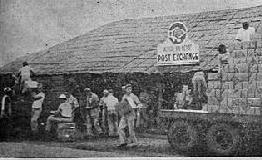 This picture speaks for itself. Unrationed beer being sold directly to the thirsty consumer. The 1600 odd cases sold vanished like "black magic"
after the sale began. The beer was unrationed because it was adjudged "Not up to snuff."
This picture speaks for itself. Unrationed beer being sold directly to the thirsty consumer. The 1600 odd cases sold vanished like "black magic"
after the sale began. The beer was unrationed because it was adjudged "Not up to snuff."
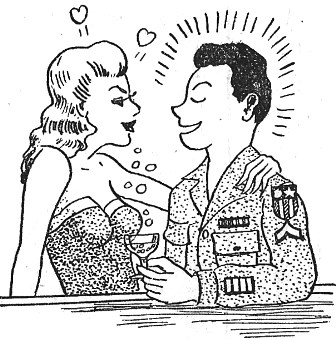
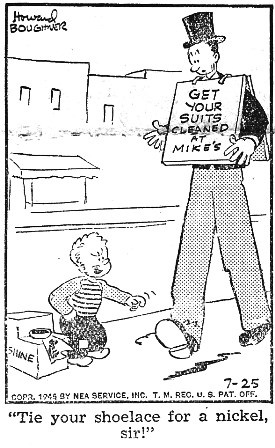

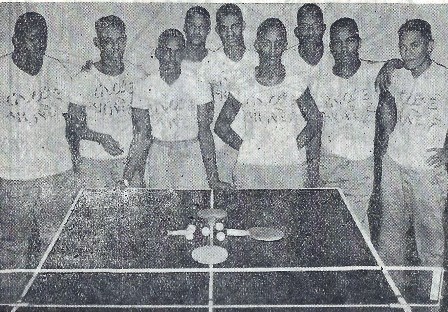 The Globetrotters Table Tennis Team that will play Rajah's Rest for the Calcutta area championship.
Left to right: S/Sgt. H. Cleveland, coach, S/Sgt. E. Lawrence, Pfc. L. Hawkins, T/Sgt. G. Aaron, Cpl. H. Drewry, T/5 S. Doplemore, T/4 L. Patterson,
T/Sgt. O. Mike and Sgt. Charles Mason, manager.
The Globetrotters Table Tennis Team that will play Rajah's Rest for the Calcutta area championship.
Left to right: S/Sgt. H. Cleveland, coach, S/Sgt. E. Lawrence, Pfc. L. Hawkins, T/Sgt. G. Aaron, Cpl. H. Drewry, T/5 S. Doplemore, T/4 L. Patterson,
T/Sgt. O. Mike and Sgt. Charles Mason, manager.
